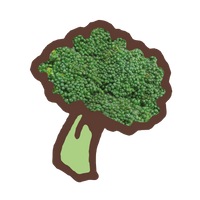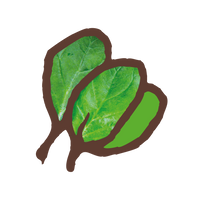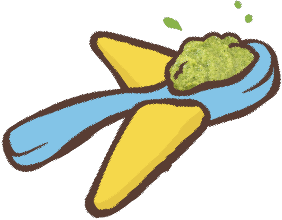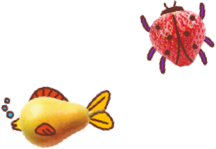Claire Baseley
Infant nutritionist / Makes Ella's Good
If your toddler is a fussy eater or is starting to say ‘no!’ to what feels like every food, don’t worry! It’s completely normal for little kids to behave like this + it’s part of their natural development. We’ve put together some tips + tricks to help create a healthy relationship with food for your toddler, plus make mealtimes and snack times that little bit easier!
Keep offering rejected foods repeatedly without any pressure. If they continue to reject them or are still wary of trying them, let your toddler explore them outside of mealtimes. By allowing them to use all their senses to give the food a squeeze, sniff and maybe even a lick, they are becoming more familiar with it without the expectation to eat it. Next time you offer it, they might be brave enough to have a taste! For toddlers it can take 15-20 tries before they give something a try so to keep a log of each time they’ve experienced a specific food. Find out more about fussy eating
Food is not just for nutrients – it’s a fun, tasty, sensory experience + it’s social too! Coming together with the family to eat + talk about the day helps create and build relationships, and it’s great to let your toddler be a part of this! We know it’s not always possible to eat together every day, but as much as you can, try to eat a little bit of food with your toddler. This helps them see you eating + enjoying a variety of yummy foods, especially those you want them to eat! Children often copy not just you but their siblings and friends which is great if they’re seeing good eating habits being modelled!
You decide what’s on the menu to eat; your toddler decides how much. Try to offer options you know your toddler will eat as well as one or two foods that they’re less keen on.
Serve food family style, for everyone to serve themselves + remember, no one has to put a food on the plate they don’t want. Ask your toddler if they would like some of each dish + only serve up what they say yes to. It’s then up to your toddler to decide how much they will eat. As long as you’re offering variety each week + role modelling healthy eating yourself, they will be getting a balanced diet. As long as you’re offering variety each week and role modelling healthy eating yourself, they will be getting a balanced diet.
Try to take a neutral approach to all foods by avoiding giving sweet treats as a reward for eating vegetables or as a comforter or distraction as this tells your toddler that sweet foods are superior to savoury or veg. It works both ways though. If you tell your little one that vegetables are delicious or over praise them when they eat some broccoli, they’ll quickly become suspicious about why you’re being so enthusiastic about some foods and not others. Take a chilled out, neutral approach to all foods.
Be careful how you talk about food with toddlers as they’re absorbing more than you might realise!
Avoid labelling sweet foods as treats, unhealthy or naughty and try not to describe vegetables as healthy or helping them to grow big + strong. This approach can make some foods (usually the naughty ones) sound more desirable than others to clever toddlers who will often see through your best intentions to promote veg! It’s also important to avoid talking negatively about your own or other’s bodies, weight and dieting. Try to be positive about your body + diet so your toddler grows up with a healthy outlook
It might take all your efforts to avoid letting your stress show when your toddler has only eaten potatoes for dinner, 3 days in a row. But little kids pick up on your anxiety really easily. If you show you’re frustrated or you try to pressure or beg your little one to eat, it can create stress at mealtimes + result in your toddler refusing food all the more. Take the pressure off, keep offering a range of healthy foods which you also eat in front of them and go at your toddler’s pace.
Eating is not just about taste. We eat + enjoy food with all our senses so try to encourage toddlers to describe the taste, colour, shape, smell + texture of foods while they’re eating. Even the sound food makes when you chew it, does it make a loud crrrunch or a big juicy squisssh?
Outside of mealtimes, encourage toddlers to explore food with all their senses, by helping to cook, shop + put food away. Engaging in sensory food play can also help familiarise toddlers with foods they might commonly reject at mealtimes. This helps to set them up a healthier relationship with food in the long run + is suuuper fun!
It can feel like it’s snack time all the time, especially if you’re at home all day. Having a set schedule for when you eat not just meals, but snacks helps toddlers as it gives them a routine, as well as giving you an answer to constant requests for snacks.
If it’s snack time in 20 minutes, let them know how long they have to wait. This not only gives toddlers a focus but hopefully avoids the meltdowns as it’s not a ‘no’. Have a “Kitchen open, kitchen closed” policy, where, outside of snack times and mealtimes the kitchen is closed + if toddlers are asking for a snack, try to come up with other activities to distract them until it’s time to eat.
Offering toddlers a choice helps them to feel in control + mealtimes are no different. Suggest 2 or 3 veggie options to have at dinner time and let them choose 1 or 2 to go on the plate. Even then, they don’t have to eat it but providing choice makes them feel more invested in the meal + more in control of what they eat.
Little kids love to help + even when they’re young, they can help with simple tasks like popping veggies into a pan (careful if there’s boiling water around) or mixing a sauce in with some pasta. Getting involved with preparing food helps familiarise little ones with ingredients + as they played a part in making it they may be more likely to eat it!
By following these steps as much as possible, your toddler will have all the tools for a healthy attitude to eating. Just remember fussiness or rejecting food isn’t a reflection on how they weaned or your parenting style – it’s a natural development stage. For more information, read more about fussy eating.








